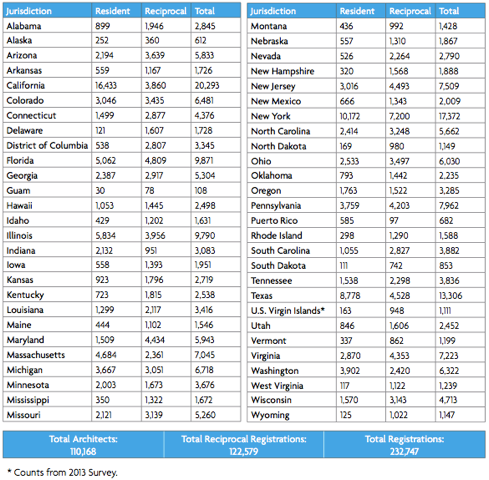There are currently 110,168 architects in the United States, according to the 2015 Survey of Architectural Registration Boards.
This marks the fourth consecutive year of growth and a 2% increase from 2014. Conducted annually by the National Council of Architectural Registration Boards (NCARB), the survey, combined with other key indicators, suggests the profession is healthy and growing.
The number of professionals working toward licensure reached an all-time high in 2015, with more than 41,500 candidates either taking the Architect Registration Examination (ARE) and/or reporting experience hours. This data, which will be available in July’s 2016 edition of NCARB by the Numbers, points to a growing interest among the next generation to become an architect.
“While there are a variety of factors that contribute to the health of the profession, these two trends point to a bright future,” said NCARB CEO Michael Armstrong. “As a record number of candidates work toward licensure, NCARB will continue to ensure our programs remain modern and inclusive, yet rigorous.”
The survey also reveals U.S. architects hold 122,579 (out-of-state) licenses, a 3% increase from 2014.
“As the economy improves, architects may be expanding their businesses across state lines,” said Armstrong. “We’ve also seen a growth in the number of architects who hold an NCARB Certificate, which facilitates reciprocal licensure.”
NCARB collects data on resident and reciprocal licenses from its 54 Member Boards, which includes the 50 states, the District of Columbia, Guam, Puerto Rico, and the U.S. Virgin Islands. The survey reflects registration data from January to December 2015.
To learn more about the Survey of Architectural Registration Boards, visit www.ncarb.org.

Related Stories
Retail Centers | Feb 20, 2018
Is there a future in retail banking? Part II
It is critical to not view the physical branch as just another sales channel, but as an important touchpoint along a customer’s journey.
Architects | Feb 15, 2018
AIASF Equity by Design to launch 2018 Equity in Architecture Survey
AIA San Francisco (AIASF) and the Equity by Design Committee, launched the third national Equity in Architecture Survey on February 12, 2018. Building upon the survey conducted in 2016, the third survey will further advance the national movement for equitable practice in the profession.
Urban Planning | Feb 14, 2018
6 urban design trends to watch in 2018
2017 saw the continuation of the evolution of expectations on the part of consumers, developers, office workers, and cities.
Office Buildings | Feb 13, 2018
Office market vacancy rate at 10-year low
Cautious development and healthy absorption across major markets contributed to the decline in vacancy, according to a new Transwestern report.
Architects | Feb 12, 2018
AIA selects seven individuals to receive the 2018 Associates Award
The recipients will be honored at the AIA Conference on Architecture 2018 in New York City.
Architects | Feb 9, 2018
AIA's 2018 Young Architects Award honors 18 recipients
The Young Architects Award recipients will be honored at the AIA Conference on Architecture 2018 in New York City.
Architects | Feb 8, 2018
Three ways cities could evolve 2018
Cities change constantly, but given the numerous disruptive factors spanning technology, policy, climate and more that will impact 2018 – it could prove to be a year of dynamic change for our urban fabric.
Architects | Feb 7, 2018
8 inefficiencies in the architecture + design industry (and possible solutions)
Matthew Rosenberg has identified 8 major inefficiencies in the architecture and design industry, as well as a solution for each of them.
Architects | Feb 5, 2018
Little names new Corporate President and COO
International architecture and design firm Little has appointed Carolyn Rickard-Brideau as its new Corporate President, and Charles Todd as its Chief Operating Officer.
Architects | Feb 1, 2018
How to generate architecture leads
One of the first steps to increasing leads for your design firm is to acknowledge that all leads are not equal, writes Hinge’s Karl Feldman.















